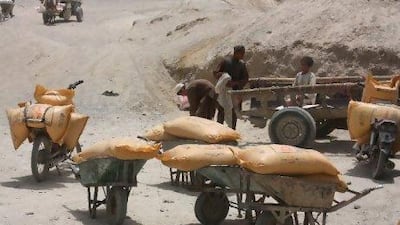MULTAN, Pakistan // The main ingredient in most of the homemade bombs that have killed hundreds of American troops in Afghanistan is fertiliser produced by a single company in Pakistan, where the US has been pushing for greater regulation.
Enough calcium ammonium nitrate fertiliser for at least 140,000 bombs was legally produced last year by the Pakistani company Pakarab Fertilizers, then smuggled by militants and their suppliers across the border into southern and eastern Afghanistan, according to US officials.
The US military says about 80 per cent of Afghan bombs are made with the fertiliser, which becomes a powerful explosive when mixed with fuel oil. The rest are made from military-grade munitions like mines or shells.
The United States began talks a year and a half ago with Pakistani officials and Pakarab, one of the country's largest companies. But there is still no regulation of distribution and sale of calcium ammonium nitrate fertiliser.
Senator Bob Casey of Pennsylvania, who led a congressional delegation to Pakistan last week to press army and civilian leaders for action, said: "If you have a host country that has a factory making a substance that ultimately becomes the problem, then that country has to contribute at least half the solution."
US officials say Pakistan and Pakarab have expressed willingness to regulate the fertiliser, which is also widely used in the manufacture of bombs used by insurgents to kill thousands of soldiers and civilians inside Pakistan. They acknowledge the difficulties: 15 years after ammonium nitrate was used in the Oklahoma City bombings, the US government only presented its proposals to regulate it on August 2.
But with the death toll from homemade bombs rising inside Afghanistan, continuing inaction by Pakistani authorities will add more strain to a US-Pakistani relationship already frayed by allegations that Islamabad is aiding Afghan insurgents. "This is a test," Senator Casey said. "The key thing now is to see results."
Pakarab, the only producer of calcium ammonium nitrate fertiliser in Pakistan, operates two factories in Punjab province, the country's agricultural heartland.
The largest is on the outskirts of Multan, an ancient city surrounded by thousands of hectares of mango orchards and cotton fields. A sprawling industrial complex of smoking chimneys, pipes and tanks surrounded by high walls, the 39-year-old facility churns out the chemical 24 hours a day when it is operating.
Lines of lorries wait outside to transport sacks of fertiliser to 2,000 distributors around the country, who then sell it to millions of Pakistani cotton, fruit and wheat farmers.
Around Multan, dealers sit in small shops in front of piled-up sacks of ammonium nitrate and other fertiliser, haggling with farmers. Most say they are aware ammonium nitrate can be used as an explosive, but none has been told to report suspicious purchases.
Pakistani fertiliser producers are not permitted to export to Afghanistan because they are subsidised by the government and their products are meant for domestic use only. But the low price of fertiliser in Pakistan, and a chronic shortage in Afghanistan, has meant that smuggling has long been rife.
The chemical, known as CAN, is often taken in lorries into southern Afghanistan repackaged as a harmless fertiliser. Other times, it is hidden under other goods, often after border guards have been paid a bribe, according to smugglers at the Chaman border and US officials.
One dealer, Mohammad Wassem, said that wealthy people with links to the insurgents placed orders for all three fertilisers produced by Pakarab. They sold the two safer varieties domestically, then trucked the ammonium nitrate across the border.
Only a fraction of the lorries that cross the border are searched, said one US official, explaining it would be impractical to stop and search the thousands of vehicles that cross the border each day.
Explosives can be made from a range of fertilisers, but it is easy to turn CAN into a bomb. Insurgents either grind or boil the small, off-white granules to separate the calcium from the nitrate, which is mixed with fuel oil, packed into a jug or box and then detonated.
The fertiliser is sold in 50-kilogram sacks, which can be used to make between two and four bombs depending on whether they are targeting vehicles or foot patrols, said Robin Best, an expert at the US military's Joint IED Defeat Organisation, who visited the Multan factory in July with a US delegation.
Such bombs, typically buried and detonated remotely or by pressure plates, have killed more than 719 Americans and wounded more than 7,440 since the conflict began in 2001, along with thousands of Afghan troops and civilians.
Last year's US death toll, 252, was as high as the two previous years combined, and 2011 is shaping up to be just as bloody.
Based on tests of residues at a limited number of blast sites, and seizures of the chemical inside Afghanistan, two US officials told the AP they believe the majority of fertiliser bombs in Afghanistan are made of CAN produced by Pakarab. One said that up to 80 per cent of the bombs were made with Pakarab fertiliser. Both asked for anonymity because of the sensitivity of the data.
Senator Casey said the US government estimates about 1 per cent of Pakarab's annual production made its ways across the border for use in bombmaking. Given that the company produced 350,000 metric tonnes in 2010, that means enough for at least 140,000 bombs was smuggled across the frontier last year, though an unknown amount was seized by Afghan and US authorities, or stockpiled.

